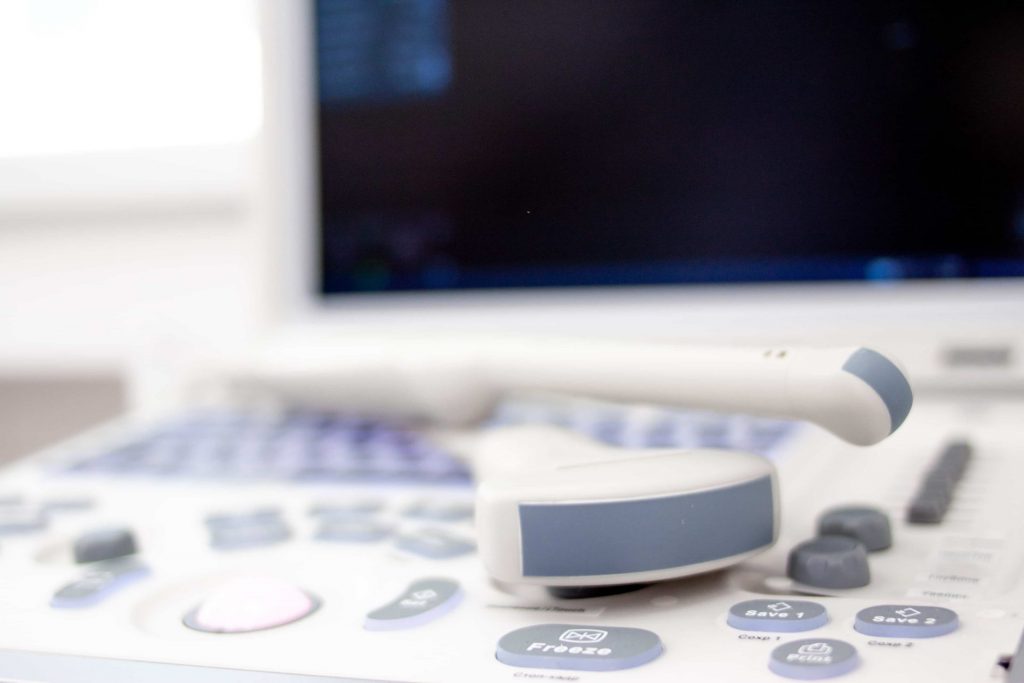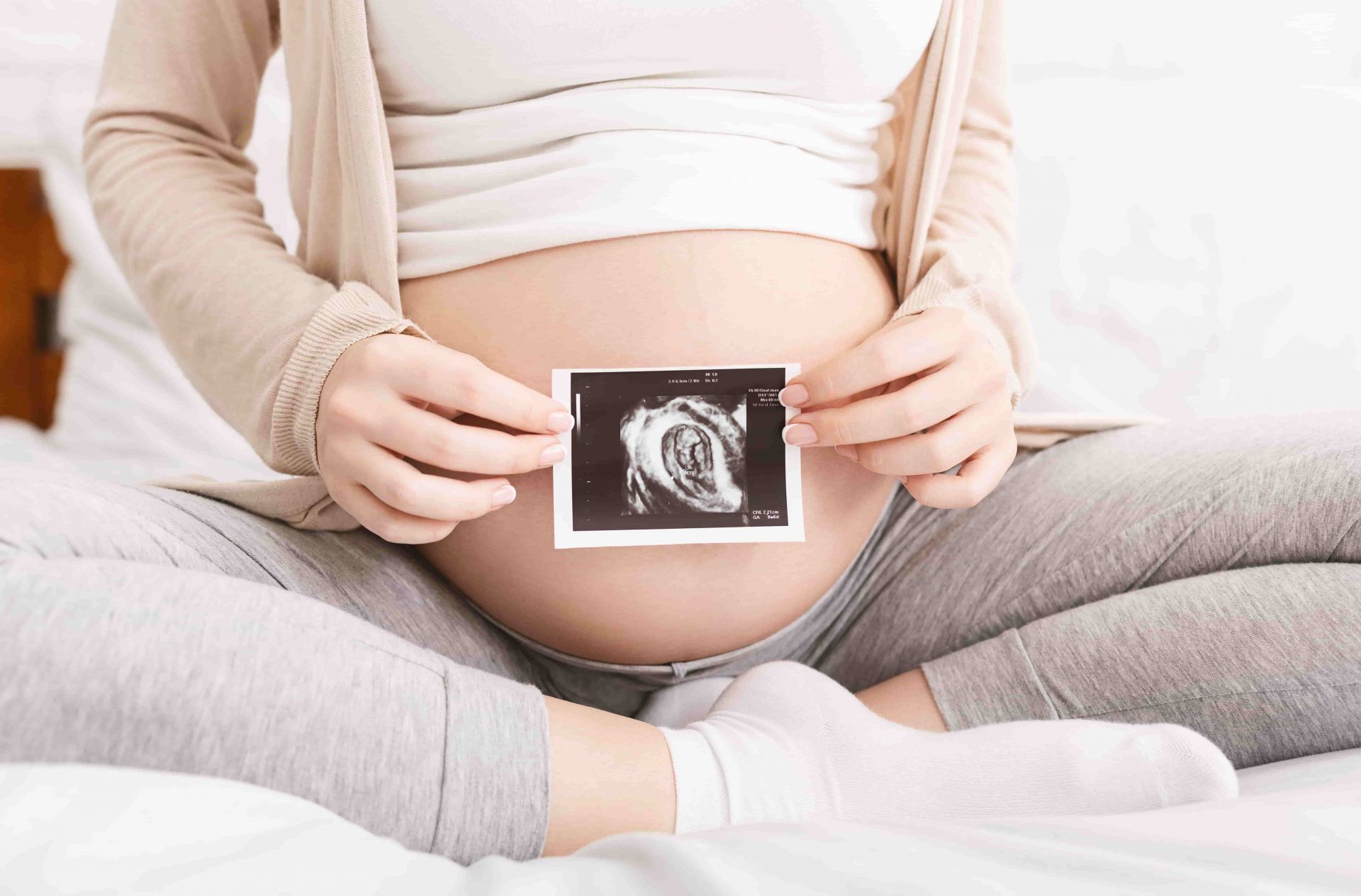Getting an ultrasound during pregnancy. It’s something that my husband Greg and I had a lengthy discussion about earlier this week so I’d thought I write a post on it!
Are routine ultrasounds safe?
Well, that depends on who you ask. It seems that the majority of medical professionals would say “Yes”.
However, there is an ever-growing number of professionals and mama’s who are shying away from the idea of getting routine ultrasounds during pregnancy.
In this article, I will do my best to give you the facts and let you decide. As with anything, there are benefits and risks. As parents, it’s up to us to decide what we think is best for our families! It’s also important to talk to your healthcare provider and share any concerns you have with them.
Please note: I am not a licensed medical professional. You should always talk to your healthcare provider about any medical concerns that you have.
What Is An Ultrasound?
So what is an ultrasound anyway?
Well, an ultrasound is done by a trained professional who uses a machine that transmits sound waves. These soundwaves travel throughout the body and bounce back towards the transducer (a wand like device that emits the soundwaves) once they hit a boundary between soft tissues.
The sound waves that bounced back are what the machine reads to create the images of the body that you see on the screen during the ultrasound.
Pretty neat technology!
Ultrasound testing is used for all sorts of things. But when talking about pregnancy, they’re used to monitor growing baby and to determine if there are any problems during development.
What Are The Types Of Ultrasounds?

There are several different types of ultrasounds, but they fall into two main categories…
Transvaginal Ultrasound: Most often used during the early stages of pregnancy. The transducer is placed inside the vagina to emit sounds frequencies and gather reflections.
Transabdominal Ultrasound: Used for the later stages of pregnancy, the transducer is placed on the belly and moved around to locate baby. This is the one that we always see in movies and where they use the jelly.
Within the Transabdominal ultrasound category, there are several different variants that can be used when trying to look for something more specific.
- 3D ultrasound: Creates a 3D image of baby. This is typically done when more detail is needed to determine if defects exist within neural tubes or facial features.
- 4D ultrasound: Also known as a 3D dynamic ultrasound. The main difference with the 4D is that it is a motion video rather than a flat image of a baby. The 4D captures a more detailed image of baby’s body- especially their facial features.
- Fetal echocardiography: This ultrasound is specifically used to look at baby’s heart and determine if there are any heart defects or abnormalities
- Doppler Ultrasound: More commonly used to look at movement within blood vessels. The best use for a doppler is to evaluate the blood flow of baby and also your placenta!
How Many Ultrasounds Do They Give And What Are They Looking for?
There is no official schedule for how many ultrasounds are given. Generally, though there are two routine ultrasounds. More are given if the provider believes there is a problem.
6-9 Week Transvaginal Ultrasound: This one is used to learn several things…
- Determine if there is a heartbeat, and how many- could be twins!
- Estimate the due date
- Check gestation is occurring where it should. Not tubular or ectopic.
18-22 Week Transabdominal Ultrasound: Provides a more detailed image and also baby is larger so there’s more to see! Things they’re looking for during this ultrasound are…
- Locate the organs to determine if they’re developing properly
- Checking on the placenta location and if there is the correct amount
- Sex of baby
- Possible characteristics of Down Syndrome
If there are additional questions about gestation, placenta location, or possible complications then more ultrasounds may be ordered in addition to the usual two.
However, studies are coming out that the number of ultrasounds given is on the rise and that pregnant women receive an average of 5.2 ultrasound scans while pregnant.
This is a 90% increase since 2004! Far more than the 2 routine scans that we so often hear about.
For my recent pregnancy, I ended up having 4, so I can understand where the 5.2 average is coming from.
What are the benefits of Ultrasounds?
Screening for deformities
One of the biggest benefits of getting routine ultrasound screenings during pregnancy is that it allows healthcare providers to identify and diagnose potential problems early on with baby.
Mainly deformities of organs, limbs, or tissue. This can be important information to know as early as possible. However one must be cautious of a misdiagnosis which I explain later on in my post.
Determining Due Date
If done in the first trimester, ultrasounds are a great way to determine the due date of the baby. Especially if mom doesn’t have regular periods or can’t remember the date of her last menstruation cycle
Learning the Sex of the Baby
When I found out I was pregnant I was DYING to know if we were having a boy or girl. Greg wanted to wait it out till birth but- but I couldn’t!
Ultrasounds can easily and accurately identify what the sex of your little one is!
What are the risks of Ultrasounds?
Despite the benefits of ultrasounds, there are some risks! All we can do as parents is weigh the benefits and risks of ultrasounds and decide what is best for the health and well-being of us and our children.
There is no right or wrong answer- it’s what you decide is best for you!
Long Term Effect Of Ultrasounds Are Unknown
Despite how often they’re given, very little is known about the long-term effects of ultrasounds on babies. The increasing use of ultrasounds on pregnant women is also concerning.
Ultrasounds can heat tissue which in some cases can create pockets of gas in body fluids or tissues. This is called cavitation.
As a result, the American Institute of Ultrasound in Medicine recommends that ultrasounds only be used when necessary. Additional Ultrasound sessions for “keepsakes” 3D-4D which is a growing trend are not encouraged. If you want a photo, it’s best to get it quickly during one of the routine sessions.
Ultrasounds have never been declared as “safe”
Just because there is no indication of a problem- does not mean that something is “safe”. In fact, most studies done to determine if ultrasounds are safe for use during pregnancy are based on old technology.
According to a research paper in 2006 by radiologists at the University of California, San Diego. In 1992 at the request of manufacturers, the output by ultrasound machines was increased by eight time improve image quality!
What’s really concerning here is that most safety studies were done prior to this 1992 change.
The public is relying on old safety studies that are no longer valid. Today’s machine put out 8x more energy!
The American Institute of Ultrasound in Medicine recognizes this, but still stands by saying there is no true evidence suggesting that they’re unsafe.
They are often misinterpreted leading to unnecessary medical procedures

Ultrasound results are too often misinterpreted. A study done in France between 2006-2009 found that approximately 8-9% of patients were falsely diagnosed. The sad thing is that medical actions are then unnecessarily taken, sometimes even leading to aborting the baby.
If you’re faced with a diagnosis and are considering drastic medical intervention- it may pay to get a second opinion elsewhere.
Ultrasounds are not shown to improve outcomes in birth
This last point I think really brings everything into perspective. A study out of Great Britain explains that
Routine ultrasound scanning does not improve the outcome of pregnancy in terms of an increased number of live births or of reduced perinatal morbidity. Routine ultrasound scanning may be effective and useful as a screening for malformation. Its use for this purpose, however, should be made explicit and take into account the risk of false positive diagnosis in addition to ethical issues.
What ultrasounds do usually lead to? More medical interventions.
Are Ultrasounds Proven to Be Safe?
There have been no studies that I’ve been able to come across that prove ultrasounds to be safe for babies. If you come across any- please send them to me!
The only thing it seems we have to go off of is the absence of any problems. At which point it’s merely assumed that ultrasounds are safe.
All of the studies that were conducted on ultrasound safety seem to have been on machines from back in the 90’s that use 1/8th the amount of energy compared to the machines used today.
Knowing all this, experts say to only use ultrasound machines when medically necessary, meaning no keepsake sessions!
I’ve said this already a few times but it’s worth repeating. You need to do what’s best for you and your family. Talk with your partner, talk with your healthcare provider, and do what you feel is best.
I don’t think there is a right or wrong answer when it comes to choosing an ultrasound. But it’s important to know what risks come with it. Hopefully this article shed some light on this for you.
Our personal decision on Ultrasounds
During my pregnancy I received 4 ultrasounds.
- 5 weeks: I had some bad cramping and wanted to make sure it wasn’t ectopic
- 8 weeks: Standard ultrasound to confirm pregnancy
- 20 weeks: Standard ultrasound for anatomy and measurement growth
- 32 weeks: Growth ultrasound and provider also wanted to check on placenta fluid that they had noticed on the 20 week scan.
You can read more about My COVID-19 Natural Birth Story (And How It Didn’t Go To Plan)
Looking back on it I was pretty quick to receive that ultrasound at 5 weeks. Because I was a first-time mom not knowing what to expect I was worried something was going wrong. Next time around I won’t be so quick to get in for an additional ultrasound unless there is medical need.
In the future I’m still on the fence whether I’d opt out of the 8 week ultrasound or not. Even though there isn’t a huge medical need for it, it made my pregnancy seem “real” and I had that deeper connection with my little bean. But I think as my confidence as a new mother continues to grow that I’ll likely opt out of the 8 week ultrasound.
After learning about the increased risks specifically around a 3D and 4D ultrasound, I can say that I will be avoiding them- especially if done just for keep sake photos.
So- are ultrasounds safe? Who knows….overall I think Ultrasounds are a great tool when deemed medically necessary. However the overuse within the medical community is concerning to me.
How about you- What are your thoughts on Ultrasounds? Do you think exposure should be limited? Or are you comfortable with going in for multiple scans during pregnancy?







0 Comments